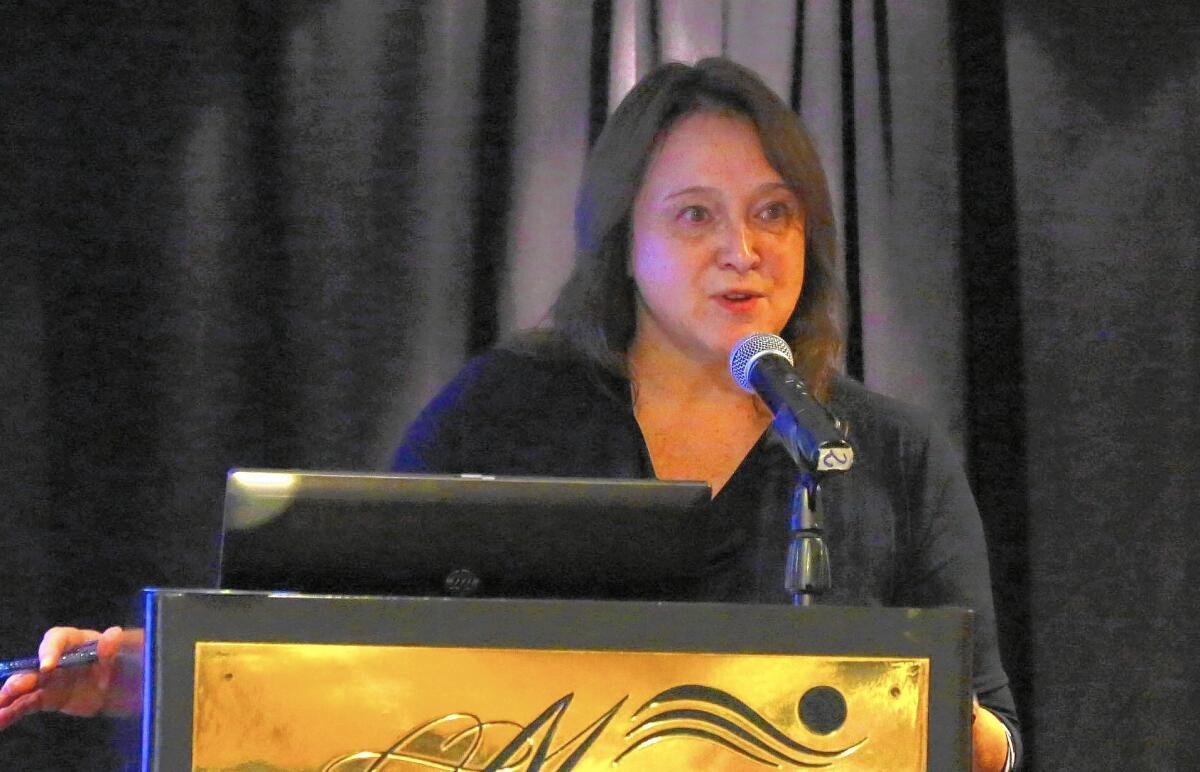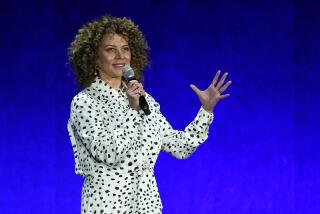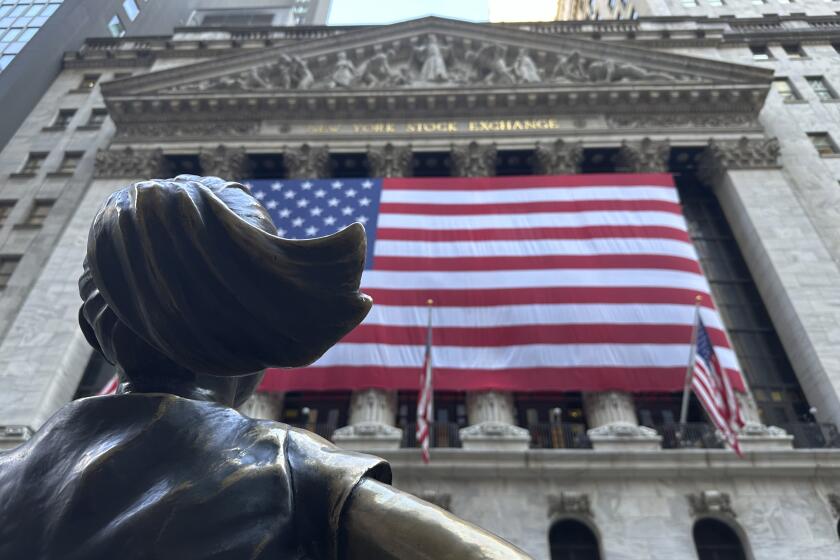Creators frustrated with Copyright Office’s outdated technology, procedures

Aviva Kempner just wanted to buy a song.
To find out who owned the song so she could buy the rights to use it, Kempner turned to the Copyright Office, an obscure, century-old federal bureau. It’s responsible for the legal underpinnings of the copyright industry, which includes those seeking to protect content as diverse as Hollywood movies and individual nature photographs.
------------
FOR THE RECORD
Copyright Office: An article in the June 24 Business section about the outdated operations of the U.S. Copyright Office included a quote from Mary Rasenberger of the Authors Guild. The quote came from her written comment for a congressional hearing, not from an oral statement at the hearing.
------------
To find the records she needed, the documentary filmmaker, who tells stories of Jewish heroes, has to send someone in person to the Copyright Office headquarters in Washington to look through hard copies of old documents.
She could hire Copyright Office staff, but the charge is $200 an hour and it takes at least six weeks to respond. Plus, what they turn up might be outdated because updated information must be submitted on paper, which can take more than 18 months to process.
Kempner estimated that dealing with the office’s inefficiencies sometimes adds weeks to production, draining staff time and resources for an independent filmmaker. Janet Fries, a copyright attorney who represents Kempner pro bono, calls her experience with the office “very typical.”
“Every time, it’s like pulling teeth,” Kempner said. “It’s just exasperating.”
Those who deal with the office said its outdated technology and procedures increasingly interfere with their ability to buy, sell and protect copyrighted works.
Now, some in Congress are pushing to modernize the Copyright Office, taking it from a 19th century relic that operates out of a cramped, paper-strewn office into a government office that can efficiently address the needs of the trillion-dollar U.S. copyright industry.
The Copyright Office was created in 1897 as a part of the Library of Congress to help the library build a collection of published works.
The librarian of Congress still appoints the register of copyrights and approves office policies. The Copyright Office’s headquarters are in a library building, and its information technology, budget and human resources are run through the library.
“It’s like if my law office was located in Starbucks and I was sharing their IT systems and their services,” said copyright attorney Dina LaPolt.
Maria Pallante, head of the Copyright Office, has repeatedly testified to Congress and spoken publicly about the need to update IT systems and office policies.
This year, Pallante launched something of a crusade to separate the office from the library, arguing publicly for the first time that the office needs independence. Without it, former Copyright Office staff say, there’s not much she can do to push the office into the 21st century because she has minimal control over IT staff and no independent authority to request money to update the office.
Pallante has won admirers and allies in Congress. Two members of the House Judiciary Committee, which has oversight of the office, announced legislation this month that would make the office independent.
“The current system is really a relic,” Lisa Dunner, a copyright lawyer and chairwoman of the American Bar Assn. section of intellectual property law. “The world is changing, and the copyright office isn’t.”
According to industry representatives and creators, the system discourages groups from registering their copyrights.
Some songwriters and makers of standardized tests delay or avoid registering because they do not trust the office’s computer security. Newspapers must be submitted in the form of costly and increasingly redundant microfiche, driving some to avoid registering altogether. Others simply get fed up with the office’s clunky registration process.
When creators don’t register, people like Kempner struggle to find an owner if they want to buy a work. Skipping registration also severely limits the legal recourse a creator can pursue if their work is used illegally.
Further hurdles await those who do register. The process for recording changes in copyright ownership, for example, still requires forms to be submitted by paper and entered manually by office staff.
A pilot project allows applicants to send in some information by mailing in a USB stick. This speeds the updates somewhat, but office staff still have to copy and paste information manually into the database.
Efforts to bring the office’s recording processes online date to 2008, but the infrastructure still has not been built. A lawyer in the office is attempting to design a database first requested in 2010.
By contrast, the Patent and Trademark Office, which uses an entirely electronic system to deal with similar documents, processed about 43 times as many documents with a slightly smaller staff, according to a report by George Washington University professor Robert Brauneis.
Marybeth Peters, former register of copyrights, recalled that when the office initially moved much of its processing online, she was denied permission to build an independent IT staff that would focus on Copyright Office needs.
Pallante now has an IT staff of 23, whom she describes primarily as liaisons to the library’s much larger IT staff. She has no authority over the larger staff and described a “breakdown in communication” about IT with the library in a recent Government Accountability Office report.
“The Library of Congress has as its mission to share with the world these works, but the Copyright Office has as its mission the preservation and protection of these creative works,” said U.S. Rep. Judy Chu (D-Monterey Park), who has been active on the topic. “These are opposite types of functions.”
Updating technology would require additional resources, but budget requests get filtered through the library.
“One of the biggest problems for anyone who runs the Copyright Office is that you don’t control your office; your budget is what the library decides to send forward,” Peters said.
The librarian also has final say on any regulations the office issues, which raises concerns among some.
“On certain bedrock contemporary issues ... the digital era has driven a wedge between the interests of libraries and rights holders,” former Copyright Office employee Mary Rasenberger, now executive director of the Authors Guild, said at a congressional hearing.
According to supporters, the pending legislation would address many of these challenges. But it faces obstacles.
The Obama administration has not weighed in on whether it will support the effort, and some members of Congress may prefer proposals that would combine the office with other intellectual property offices or put it into the Department of Commerce, which Pallante opposes.
The two representatives who drafted the language both say they hope to pass the bill by the end of this congressional session, Jan. 3, 2017.
June Besek, a Columbia Law School professor and copyright expert, said she wants a solution soon.
“Now is the time to turn it into a 21st century Copyright Office,” she said, “because otherwise, we’ll be doing it just in time for the 22nd century.”
More to Read
Inside the business of entertainment
The Wide Shot brings you news, analysis and insights on everything from streaming wars to production — and what it all means for the future.
You may occasionally receive promotional content from the Los Angeles Times.






